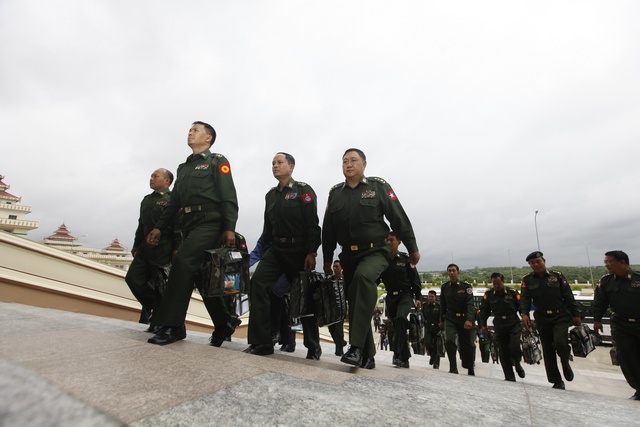American oil and gas companies are now free to suck out Burma’s resources along with global corporations. President Obama gave US companies the green light to invest in Burma and work with the notorious State-owned MOGE, the Myanma Oil and Gas Enterprise on Wednesday.
Now, those who were once blacklisted by the governments for their association with the military junta will become the west’s new partners. Although Burma’s natural resources should contribute to the general welfare of the public, the generals, ex-generals and their associates have sold the country’s resources off for their own personal interests.
Despite Daw Aung San Suu Kyi’s warnings that increased transparency and accountability from state enterprises and western investors were needed before corporations begin pouring into the country, sanctions have been dropped.
Genuine reconciliation between the nominally civilian government and the pro-democracy opposition groups has yet to be completely achieved, while reconciliation between the ex-generals and western governments – so-called supporters of Burma’s democracy movement – seems to have been cemented.
The country’s natural gas and oil reserves have served as the military’s lifeline and continues to fund the recently installed civilian government of Thein Sein. With the revenues flowing in from these profitable enterprises, the military has increased its capacity with respect to personnel and weaponry.
Behind the largely symbolic and practically ineffective sanctions, western oil giants Unocal, Chevron and Total have worked as long-term business partners with the generals, the war-criminals and some of the most brutal tyrants in the world.
Exact figures on how profitable these firms have been in Burma are hard to come by. However, one indicator of their wealth is the amount of the state budget that is allocated to the government’s military.
The regime has spent millions of dollars training military officers in Russia who study nuclear and missile technology. According to media reports, at least 10,000 officers have been trained at Russian universities during the past few years.
While the regime spends a substantial amount of funds to strengthen the country’s military and enrich the generals, those who have been oppressed continue to suffer. The war in Kachin state, where more than 70,000 people have been displaced, still has no end on the horizon while fighting continues to break out in southern Shan state after ceasefires and several rounds of talks have been held.
Recent sectarian strife in Arakan state and the arrests of student activists across the country points out that something ominous is going on behind the scenes. The riots in western Burma diverted the public’s attention from assessing the government’s reform measures, while the Tatmadaw seems to have successfully won back the public’s support. The regime’s cronies also played off the country’s inflamed nationalism and provided generous donations to the victims of the riots.
[pullquote]“But who is truly able to properly identify the military’s entities and separate the wheat from the chaff?”[/pullquote]
But still justice is lacking.
The three Rohingya men who were convicted of raping and murdering an Arakanese woman, which helped spark the riots, were all sentenced to death behind closed doors (one of the men was posthumously sentenced after he committed suicide while incarcerated according to officials).
And what about the people behind the mob attack that brutally beat ten Muslims to death in the middle of the street in Taunggup? The team assembled by the government to investigate the matter was due to report their findings by the end of June. However, state media groups have said that authorities are struggling to find an individual that will provide testimony, while eyewitness accounts reportedly saw local authorities at the scene who failed to intervene to put a stop to the carnage.
Earlier this month, authorities arrested 20 activists the day before commemoration ceremonies were supposed to held to remember the 50th anniversary of the military’s attack on university students. The activists were detained overnight and questioned before being released the next day. Such lawless and authoritarian gestures targeting students reveal that the Thein Sein regime may not be so different than their predecessors.
What the so-called reformist government of Thein Sein wants is simple: the termination of all western sanctions and concessions from the opposition. Since the parliament convened and the civilian government was installed last year, the ultimate political objective of the junta-turned-civilian government is to make the opposition accept Burma’s militarized 2008 constitution. At the same time, nominal reforms were carried out to attract the west’s attention.
So who wins the game in the end?
The cronies and generals clothed in civilian garbs and uniforms are now set to be the business partners with the country’s new corporate investors. President Obama warned potential investors not to deal with military entities. But who is truly able to properly identify the military’s entities and separate the wheat from the chaff?
While the generals and their associates go about their business as usual behind the scaffolding propping up the superficial decorations lauding reforms, war continues in ethnic areas and hundreds of political prisoners waste away behind bars.
-Zaw Nay Aung is the Director at Burma Independence Advocates



